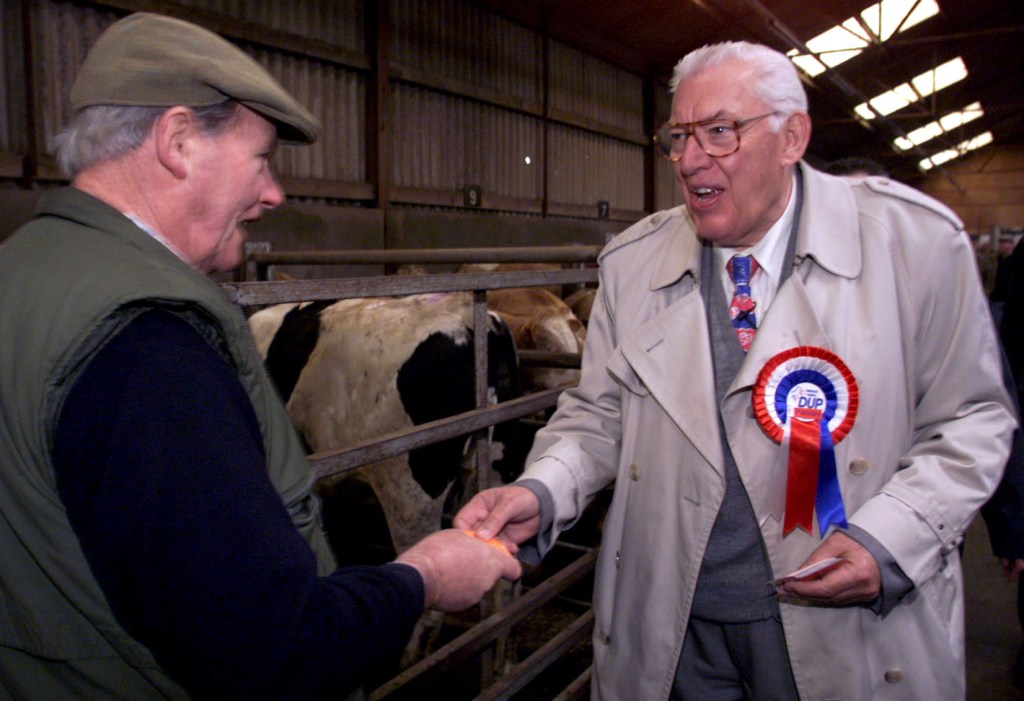Hey Britain: if you liked UKIP, you’re going to love the DUP.
Against many expectations, Britain took a look at its political options yesterday, shrugged and plumped for a hung parliament. Today, Theresa May announced she will form a government propped up by the Democratic Unionist Party, who won ten seats in Northern Ireland.
Videos by VICE
Who they?
Even in Northern Ireland – which has a history of what could be termed “colourful politics” – the DUP stands out for its almost cartoonish embodiment of everything the left hates or fears about the right. Inspired by a combination of religious social conservatism and the kind of blood-and-soil belief in British identity UKIP has failed to resurrect, they’re the closest thing this island has to the American evangelical right. And even better, when they’re not giving off huge whiffs of dodginess, they’re incompetent.
Let’s go back to the start.
The DUP mutated from the Protestant Unionist Party in 1971, a time when Northern Ireland was sinking into chaos. Explicitly offering a populist alternative to the more bourgeois Ulster Unionist Party, it was initially the Ian Paisley party in all but name. Paisley was a charismatic fire-and-brimstone preacher who founded a church that literally describes itself as “fundamentalist”, never saw a form of social progress he didn’t hate and regularly denounced the Pope as the antichrist.
His later conversion to power-sharing and a semblance of basic human decency means Paisley can be seen as a deceptively benign figure, but at the time his tub-thumping speeches, naked sectarianism and skill at inciting trouble with a degree of deniability meant he was a dangerous man indeed. He was instrumental in the two-week general strike that brought down the Sunningdale agreement in 1974, a deal extremely similar to the 1998 agreement but thought unpalatable before thousands more had died. Even as late as 2014, he maintained that two loyalist bombs in the Republic of Ireland that killed 33 during the strike were brought on by the Southern government – his constant denunciations of their papist idolatry having nothing to do with it.
This kind of thing goes on and on. In 1981, Paisley launched Third Force, an anti-IRA militia that claimed thousands of members and spooked the government so much they got the Americans to withdraw Paisley’s visa for a speaking tour in the US. The campaign against the Anglo-Irish Agreement of 1985, which solidified the principle of consent regarding Northern Ireland’s constitutional position, saw Paisley share platforms with people who imported arms for loyalist groups from South Africa, and deputy leader Peter Robinson, a future First Minister, was arrested in a bizarre armed incursion across the border into the Republic.
This prehistory may all be fun, rough-and-tumble stuff, but that was then and now is now. If you held every politician in Northern Ireland up by their past alone, you’d have a tough time getting two of them in a room together. So what have the DUP done for Northern Ireland lately?
Well, their intransigence over arms decommissioning led to them becoming Northern Ireland’s biggest party after the treacle-slow progress post-agreement led to Sinn Fein and the DUP becoming the biggest parties. How have they used this power?
First, the policies. Northern Ireland is exceptional in many ways, not least because of the handsomeness of its writers, but it’s also the only place in the British Isles where neither gay marriage nor abortion is legal. The former has been repeatedly blocked by the DUP, using the Northern Ireland Assembly’s “petition of concern” procedure, a veto option put in place to prevent either party trying anything too crazily sectarian. How this helps protect the Protestant community from Catholic subordination is unclear, but it makes a certain sense in a country that in 2011 reported itself to be 82.3 percent Christian, compared to 59 percent in England.
Next, the scandals. The DUP are the gift that keeps on giving when it comes to clusterfucks – people in the rest of the UK don’t know what they’re missing. The Red Sky scandal of 2011, where a government contract was handed out clearly on the basis of religion, was only anachronistic. More baroque was Iris Robinson’s fall in 2010. Robinson was an MP who casually called homosexuality an “abomination”, but ended up resigning after questions were asked over money being flung at her 19-year-old lover.
Most recently, and most damningly, the RHI scandal of late last year led to the collapse of government in Northern Ireland. Being charitable, forgetting to put a cap on renewable energy subsidies, which led to a slew of farmers being paid fortunes for heating empty barns, could be characterised as bad admin. Whatever it was, First Minister Arlene Foster was implicated in a clumsy attempt at a cover up, and her personal uselessness has cost the British taxpayer £500 million.
So: these are Theresa May’s new best friends. What price they eke out of her is unclear at this point – refusal to countenance special EU status for Northern Ireland? War with the Vatican? A space elevator constructed out of Ballymena?
What is clear is that, thanks to the unique situation in Northern Ireland, a party that can rely on a base thanks to block voting, and whose reactionary policies have never really been tested in the open, now holds casting votes as the UK lumbers toward its biggest constitutional shift in decades.
Have fun, everybody!
More
From VICE
-

Screenshot: Microsoft -

Photo: Diamond Dogs / Getty Images -

Photo: Mary Long / Getty Images -

Photo: Mario De Moya F / Getty Images
